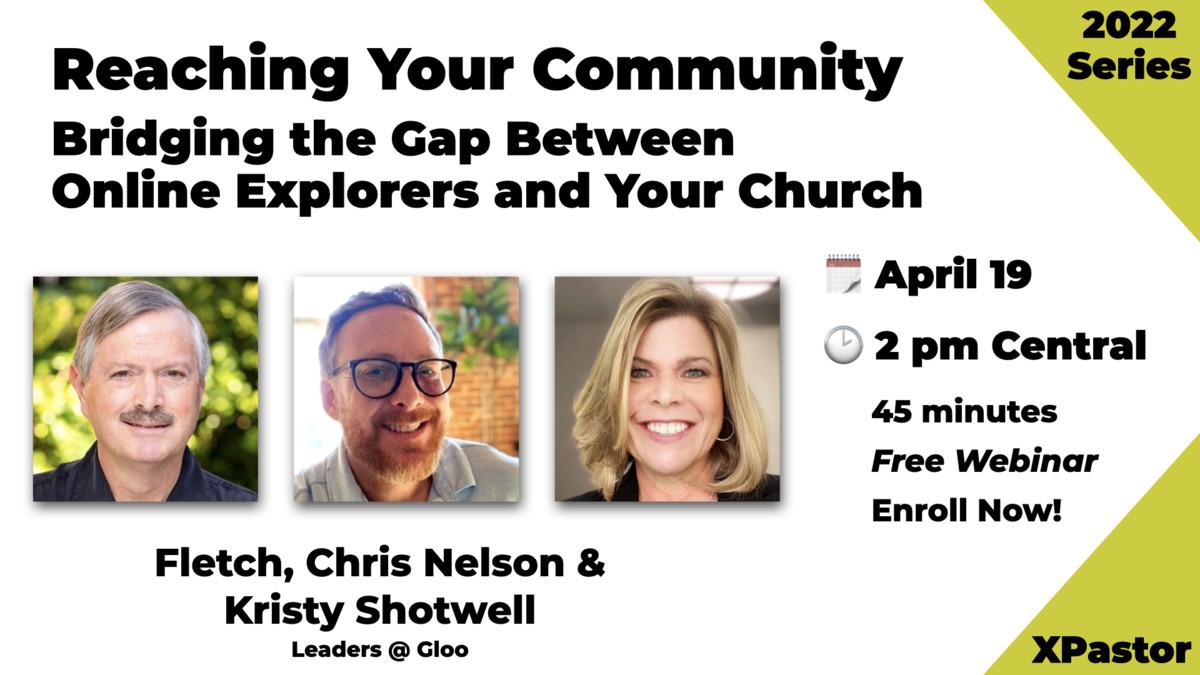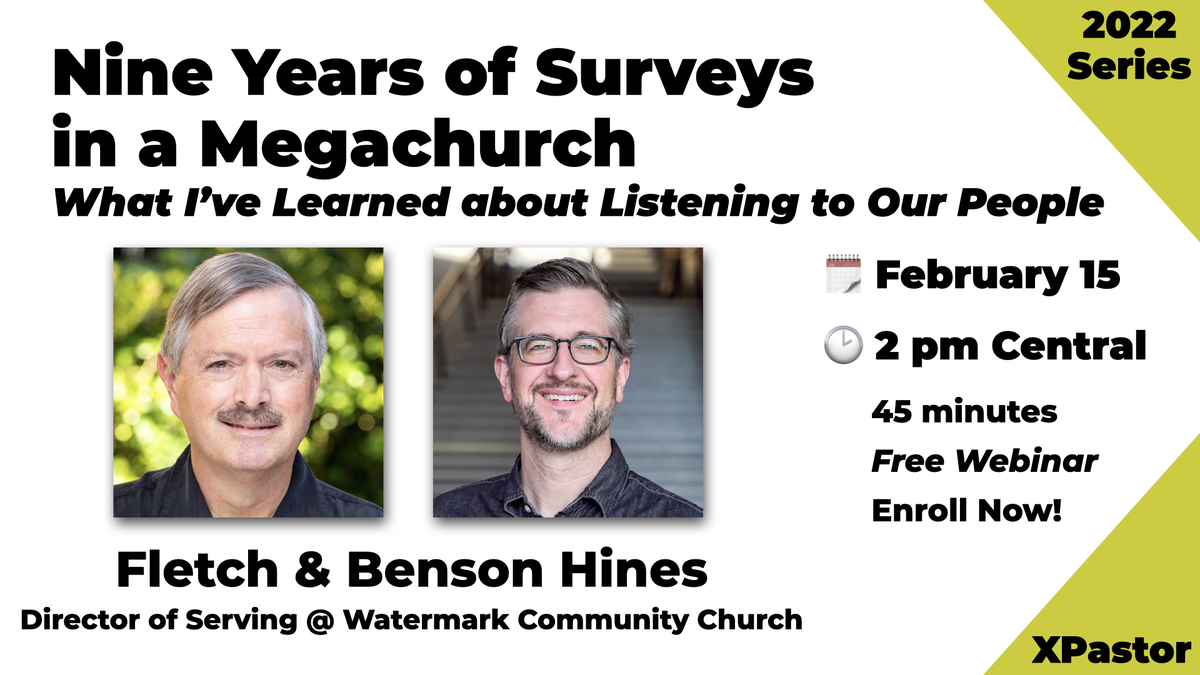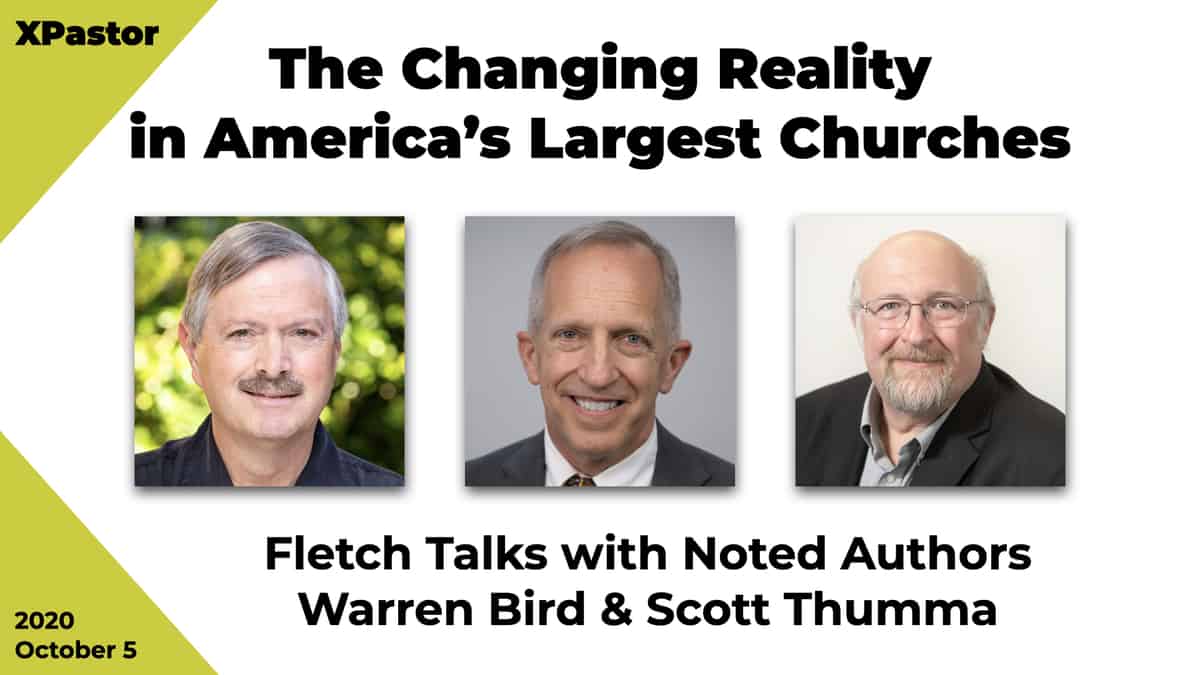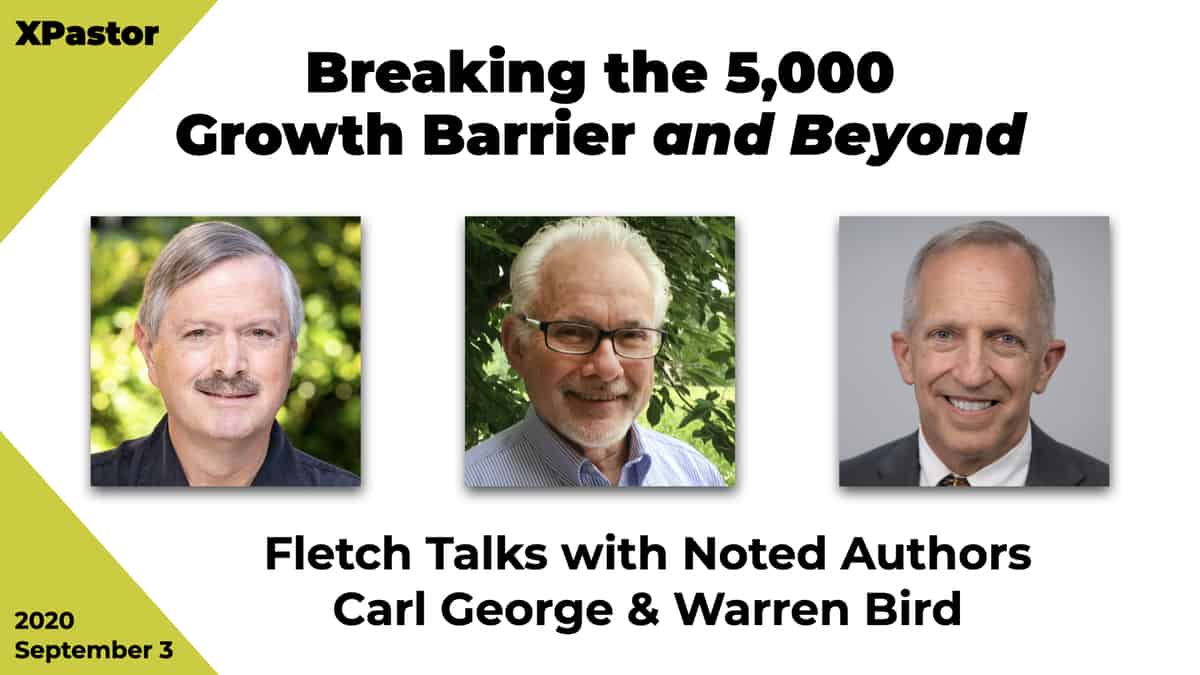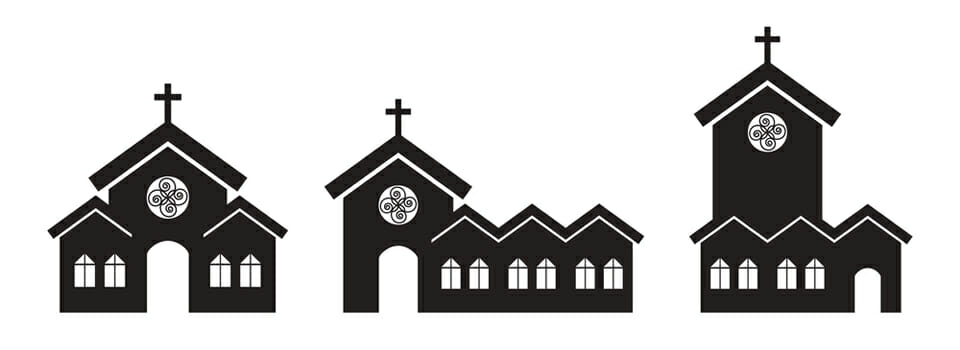In January 2004, Dr. Charles Swindoll, Senior Pastor of Stonebriar Community Church, announced his decision to David Chavanne, the church’s Senior Executive Pastor. The internationally known radio preacher, who likes to be called “Chuck,” had decided that Stonebriar would add a third worship service at 8:00 on Sunday morning.
The decision culminated a two-year period of Stonebriar being at capacity and the church wondering if Chuck would add a third service. From the moment that Chavanne heard the decision, he knew that he had an enormous amount of work.
- As Executive Pastor, how could he prepare the staff and congregation?
- How could people be persuaded to come at 8:00 in the morning?
- What decisions needed to be made and what steps needed to be taken so that this third service would be successful and go smoothly for the entire church?
Six years prior, the church had an extremely successful start-up. Now Chavanne wondered how Stonebriar Community Church could grow to the next level.
History of an “Instant Megachurch”
News reports assert that the seeds of Stonebriar Community Church germinated in 1994. The Dallas Morning News reports that “When the Rev. Charles Swindoll became president of Dallas Theological Seminary four years ago, he vowed he wasn’t giving up on leading a church.” Later in the same article, “Seminary spokesman Michael Edwards said Dr. Swindoll ‘has talked all along about wanting a pulpit, ever since he came here. Everyone knew he was going to be in a pulpit. I don’t think they knew he would start a church. He’s a pastor at heart.’” The first thought of a church plant was not in Dallas:
In 1994, when Mr. Swindoll was named Dallas Theological Seminary’s president, he was pastor of First Evangelical Church in Fullerton, Calif., where Sunday attendance often topped 6,000. When he took the Dallas job, he announced plans to start a new church in Nashville, Tennessee, and move his radio program there. He said he liked Nashville better than Dallas, which he considered too metropolitan, and thought he could commute between the two jobs. But he never found people in Nashville who were willing to start a new church.
When the Nashville idea didn’t work, he looked at existing churches in Dallas: ‘Then he talked seriously with two Dallas churches—Scofield Memorial Church in Lake Highlands and Fellowship Bible Church in Far North Dallas. Neither provided the right fit.’
Three years later in November 1997, plans were made for a new church in the Dallas area:
Plans for the church began coming together in November, when Dallas businessman Richard Weyand approached Dr. Swindoll and his wife, Cynthia, about starting a church in Frisco. Mr. Weyand and his wife, Kay Lynn, moved to Frisco seven years ago but continued their membership at Northwest Bible Church in Dallas, where they’ve been members since 1972.
Perhaps unknown to Swindoll, Northwest Bible Church had plans dating back to 1991 to begin a new church in the Frisco area. However, those plans never left the drawing board. Northwest had a leadership crisis in the late 1990’s. As members of Northwest left and went to Stonebriar, some members of Stonebriar referred to Stonebriar as “Northwest North.” Other members of Northwest went to Watermark Community Church and other churches in the Dallas area.
In July 1998, Swindoll was ready to make a public announcement about the beginning of a new church:
On Thursday he made good on his promise, announcing that he is organizing a new interdenominational congregation on a 60-acre cornfield in Frisco. He said he will continue his roles as seminary president and as the broadcaster of ‘Insight for Living,’ a radio program aired worldwide 1,600 times daily. The new congregation, to be called Stonebriar Community Church, will begin meeting by early fall.
When a leader of such stature in the Christian community plants a church, one expects it to start big and then grow:
This will not be just any new church. Organizers expect it to grow quickly to megachurch status because Dr. Swindoll, 63, is a world-renowned preacher and author with a huge following willing to drive for miles to hear him. And the church will be situated in a wealthy, rapidly growing suburban frontier. ‘With the kind of growth we’re seeing out in the Frisco area, I can envision a remarkable beginning as folks from all over, searching for this kind of church, can find what they have been hungering for,’ Dr. Swindoll, who likes to be called Chuck, said in a prepared statement.
From the beginning, Swindoll had a clear purpose and direction for the church:
In his statement, Dr. Swindoll described the church as a place ‘where Christ will be exalted and God’s people will be nurtured—people of all ages, colors, cultures and backgrounds.’ He plans to bring to the church a mixture of ‘great music, meaningful worship, in-depth relationships, evangelistic zeal and, certainly, a strong Bible-teaching ministry.’
In the Dallas tradition of megachurches, it seemed another one was about to begin.
As hoped and expected, Stonebriar Community Church began with sizeable numbers and then rapidly grew. News reports commonly used the word double to describe the rapid growth: “‘They had 200 people show up the first night,’ says Swindoll’s aide, Emily Edwards. ‘That went to 400 the next week and doubled again the third week.’” Christianity Today documents the rapid growth: “The congregation first met when 300 people gathered October 14 at Stonebriar Country Club in Frisco. Less than a month later, they moved to Trinity Christian Academy in Addison for three Wednesdays.” Though there is a discrepancy between these two news accounts, the overwhelming fact is that Stonebriar rapidly grew.
By late 1998, the church began meeting on Sundays: “In December, 750 people turned out each week for its first Sunday services.” In an April 26, 1999 report in Christianity Today, the church was reported as needing a second service: “This month, the non-denominational Stonebriar Community Church will add a second service. Construction is beginning on a 2,500-seat auditorium, a mere stopgap until a 6,000-seat sanctuary can be built.” Also by April, Stonebriar had grown to the Hartford Institute’s measurable level of megachurch, two thousand people. The growth of the first five months can be represented in a chart:
One of Stonebriar’s pastors gives an interesting aside: “The church has advertised only once, and the attendance jumped from 1,100 to 2,000, according to associate pastor Mark Dane, who is married to one of Swindoll’s daughters, Colleen. No more advertising is expected until the church moves into larger quarters.”
There has been discussion in the national press about Stonebriar. The Dallas Morning News examined the growth of the church and the role of Swindoll as a radio preacher:
‘He’s got a winsome spirit about him, somewhat like Billy Graham,’ said Larry Eskridge, associate director of the Institute for the Study of American Evangelicals at Wheaton College in Illinois. ‘He’s able to present his own experiences and spiritual pilgrimages, and people identify with him.’
Dr. Eskridge said that although most Americans are familiar with television evangelists such as Pat Robertson and Jerry Falwell, in-the-know evangelicals pay more attention to radio preachers such as Mr. Swindoll, who is president of Dallas Theological Seminary.
‘He becomes sort of a daily friend,’ Dr. Eskridge said.
Dr. Eskridge makes an important assertion as it relates to the beginning of Stonebriar. Many of the initial attendees felt that they had a relationship, albeit through radio, with Swindoll. The article continues with a case in point:
Which is the reason Dan Durick immediately joined when he heard that Mr. Swindoll was starting Stonebriar.
‘I’ve listened to him on the radio for years,’ said Mr. Durick, a Lewisville caterer who is donating a weekly breakfast buffet for the burgeoning congregation.
So far, he said, he has donated 500 pounds of coffee, 100 gallons of juice, 40 dozen bagels and 40 dozen muffins. This month he expects to double the amount of food he loads up at 4:00 a.m. each Sunday to bring to worship.
As Mr. Durick chatted, droves of people filled the gymnasium at Collin County Community College’s Preston Ridge Campus, where the new church meets. Congregants sat on 750 white patio chairs—so new that the room smelled of plastic.
Stonebriar initially attracted those who knew of Swindoll through either his radio preaching, books, or presidency of Dallas Seminary. As seen with Dan Durick, some of these early attenders had a high commitment to the fledgling church.
From the beginning, Stonebriar had critics who addressed both the planting of the church and its future transition:
‘Mr. Swindoll may need a free spirit to keep the church successful,’ according to Carol Childress, director of information for Leadership Network, an evangelical Christian think tank in Dallas. ‘You have to have glue to hold people together,’ Ms. Childress said. ‘As wonderful a preacher as Chuck Swindoll is, he can’t be that glue. Because at some point he won’t be there.’ She said Stonebriar will need to pay attention to important trends. One is the increasing use of the senses in worship not just listening to a sermon, but also seeing artwork, touching fabric and brick, even smelling incense. Another trend is the waning of superstar preachers as people’s main reason for choosing a church, she said. But none of that is insurmountable for one essential reason, she said: ‘Chuck Swindoll is such a fantastic communicator.’
This line of thinking assumes that the church will be started and built around Chuck Swindoll. To counter this, one may consider that Swindoll was a successful pastor of a church in Fullerton, California, which continued beyond Swindoll’s departure in 1994.
Another line of criticism centered on starting another large church, with the assumption that the attendees would come from small churches. Several Letters to the Editor were received and published in Christianity Today in 1999:
Regarding the April 26 news article ‘Church Growth: Swindoll Starts Instant Megachurch’
If he missed preaching, why didn’t Chuck volunteer 25 or 30 weekends a year to go out to the places where some of his seminary graduates are struggling to build churches? ~Douglas Connelly, Flint, Michigan.
Is Chuck Swindoll’s ‘instant megachurch’ an indication of the condition that American Christianity has fallen to at the end of the twentieth century? Nowhere in the article is there any indication of any evangelism taking place through the preaching of Dr. Swindoll at his new church, which there surely would be if he had indeed made 2,000 new converts. Now that would really be news! ~Jon Eric Pipes, Keswick, Ontario, Canada
I hope I’m wrong, but I find it hard to believe that Stonebriar Community found 2,000 unchurched or pagan boomers and Gen-Xers just waiting for someone to invite them to church. ~William Pile, Los Angeles, California
There is a great deal of speculation in these letters. Perhaps some future researcher can substantially determine whether the new members came from existing megachurches, existing small to medium-sized churches, no church home or no church background. Whatever the source of the new members, by the time of these letters in June 1999, two thousand people called Stonebriar their church home. Yet, the church continued to grow.
By January, 2001, Stonebriar had completed its first building: “And next Sunday, the 3-year-old congregation of Stonebriar Community Church will worship for the first time in a building of its own when it opens the doors of a new 115,000-square-foot facility on a 60-acre site in Frisco. Pick practically any city in Collin County where the homebuilders are busy, and you’ll find a religious-building boom going on, too.”
Stonebriar continued rapid growth beyond two thousand worshippers. In January 2003, David Welsh, Stonebriar’s Director of Administrative Services, discussed the growth issues in an exclusive interview in Church Executive Magazine:
We’re at 3,200 in attendance, and that’s also a part of the challenge. In some ways we model some of the IT companies that just blew up in size ten years ago and grew so fast, and quite frankly, we’ve made the same kinds of mistakes. But you evolve and you get an opportunity like the one we have now. We have two worship services, and we have a worship center that seats 1,500 people. At least we’ve got a chance right now to catch up and do some of the kinds of programs our members are requesting. For example, we had our first fall festival this year. Here we are doing something like this for the first time, and our challenge is that we’re not like a lot of other churches—we didn’t start off with 50 kids; we started off with 1,000 kids.
In building a facility for an instant megachurch, there were significant challenges that Stonebriar faced. Welsh commented in the same article:
We held a two-day elder and senior staff retreat where each ministry planned out the next five years. We realized that planning is the very first step. We also had to differentiate between the needs and the wants. What are the needs of the congregation? What are the demographics in the community? What’s the target market? How do all those things fit into the goals for ministry?
I have learned that building a facility is a huge commitment not to be taken lightly. The key is to have a vision of what you want. I think a lot of people go into construction projects not having an absolutely clear vision of what they want, and they expect the architect to come up with that vision. I think if you do that without communicating it clearly, you’re going to have some misunderstandings and some issues.
I did not employ a professional cost estimator on a previous project. I thought I was doing the right thing by bringing in a general contractor on the front end of the project. He was too conservative in his estimates, causing the church to build too small a room for a growing worship service. I regret that to this day!
In the same article, Greg Welsh attributes a great deal of mentoring and encouragement to David Chavanne, Stonebriar’s Executive Pastor.
By 2003 the church had grown to have a General Fund of almost 6 million dollars, with an additional six hundred thousand in Building Fund donations that fiscal year. The growth of Stonebriar can be charted from its first meetings in October 1998 to January 2003:
The church has remained at thirty-two hundred worshippers in the two worship services. The church of explosive growth desperately needed staff pastors. By January 1999, the church had two staff members: “Two of the Swindolls’ four grown children have followed them here. Colleen Dane, who is coordinating the children’s ministry, moved with her husband, the Rev. Mark Dane, one of the associate pastors, and their three small children. And Chuck Swindoll, Jr. will serve as the sound engineer. He brought his wife, Jeni, and their two small children.” Within two months, the church would add an Executive Pastor. In the Dallas style of megachurches, Stonebriar was born an instant megachurch and had an Executive Pastor to oversee it.
At the current time, the issue of church governance for Stonebriar Community Church is difficult to document. The four-year-old church has a Charter Constitution and is still working on an official constitution. Currently, new Elders are appointed by the existing Elder Board. The church does not hold congregational meetings to discuss or vote on issues. The Senior Pastor is appointed by the Elder Board and the Senior Pastor appoints, or delegates responsibility to appoint, all other staff. The future polity of the church is unknown but is assumed to follow the current format. The church has a conservative evangelical doctrinal statement.
While the governance issues may trouble those who prefer a more congregational style of government, Stonebriar endeavors to communicate well with its members. The church spends a considerable amount of time and money on many communication pieces including a website, a ten-page monthly newsletter, ministry updates and informational flyers. The church posts financial information in the monthly newsletter and on the church’s website. The church leadership has been forthcoming with discussing difficult issues. This is exemplified by David Welsh in his interview with Church Executive magazine. The openness in discussing challenging issues for Stonebriar is spearheaded by Swindoll. To over thirty pastors, Swindoll and his pastors presented an honest assessment of Stonebriar and gave candid answers to questions in a Dallas Seminary’s Doctor of Ministry course.
Another vehicle to convey church governance and chain of command authority is through job descriptions. The job profile for the Executive Pastor of Stonebriar Community Church provides insight on these areas:
To assist the Senior Pastor as the Executive Pastor of Stonebriar Community Church. His primary responsibility will be the supervision of the senior staff and oversight of the ministries of the Church so that the Senior Pastor can continue his main responsibility of ‘teaching and preaching of God’s Word.’
The Senior Executive Pastor’s task will be to assist, not replace, the Senior Pastor in these areas. The desired end would be to increase the Senior Pastor’s actual time with the senior staff for the purpose of relationship, vision and ministry, yet decrease his actual time and involvement in the preparation and continuity of these responsibilities.
This purpose of the Executive Pastor of Stonebriar fits in within the thesis of this dissertation, to implement the vision of the Senior Pastor. That task is specifically addressed in the phrases “to assist, not replace the Senior Pastor” and “his primary responsibility will be the supervision of the senior staff.” The purpose of the Executive Pastor at Stonebriar is to allow the Senior Pastor to focus on teaching and preaching. The Executive Pastor is to be the second-in-command, clearly defining the chain of command authority. He is the lone staff member who reports to the Senior Pastor, with all other senior staff reporting to him.
The job description from Stonebriar also addresses the issue of the Executive Pastor implementing the policy of the governing board. It says that the Executive Pastor shall “implement the direction and plans that originate in the Board of Elders,” and “oversee long-range strategic plans for the ministry.” The Elders of Stonebriar recognized that it is not in the best interests of the church for Chuck Swindoll to implement the policy and plans of the Elders. An organizational chart of Stonebriar can be constructed:
The role of the Finance Committee and Chief Financial Officer is discussed below in the Executive Pastor Interview. As the Executive Pastor also serves on the Elder Board, the Executive Pastor reviews the work of the Finance Committee.
The history section of the Case-Study Interview Questions for Stonebriar Community Church shows an instant megachurch founded by a Seminary President and internationally recognized radio preacher, who at the foremost considers himself a pastor. The rapid growth of the church, to two thousand worshippers within fourteen months and over three thousand in three years, is a significant causative factor for the employment of the Executive Pastor within months of the church’s founding. The continuance of Swindoll as President of Dallas Seminary for two years after the church’s founding is a second significant causative factor for the strong second-in-command role of an Executive Pastor at Stonebriar. This section has demonstrated the need for an Executive Pastor at Stonebriar to implement the vision of the Senior Pastor and the policies of the governing board.
The Executive Pastor
The Executive Pastor Interview is a part of the Case-Study Interview Questions. This section is exclusively derived from a personal interview with David Chavanne, Senior Executive Pastor of Stonebriar Community Church. David Chavanne and Chuck Swindoll got to know one another socially through hunting trips organized through Dallas Theological Seminary. In one of the first services at Stonebriar, Swindoll mentioned one of those trips: “Mr. Swindoll started by telling congregants he’d gotten a rifle, a shotgun and a knife for Christmas which he intended to use during a father-son hunting trip sponsored by Dallas Theological Seminary this weekend. He invited his giggling congregants to sign up for the trip.” In addition to the hunting trips, David was the Chairman of Alumni contributions for a capital campaign of Dallas Seminary. The two men knew each other, but were not close. They had never talked about church business or theology.
Before coming to Stonebriar Community Church, David Chavanne had been a pastor in a Bible church in Shreveport for twenty-one years, followed by four years in Houston. In 1998 and 1999, David was recovering from cancer and building a family ranch in the Texas hill country. He was serving as Vice President of the Oldham Little Church Foundation, a non-profit organization which assists churches of under three hundred people in attendance. One day in 1999, Chuck Swindoll called and David thought that Chuck was asking for a grant. “Chuck said, ‘I don’t want your money, I want you.’ He challenged me to leave this wonderful life and come to Stonebriar, having met for three months; they only had three staff members and two thousand worshippers. My wife and I were two weeks away from moving into our dream home. Well, we came up, met, prayed and I said ‘yes.’”
From the working relationship, the two men became close friends. The bonds of a quality partnership were forged in the sweat of ministry:
We work well together. I protect his time and energy. I do things in his absence the way he would do them, and this was especially true in my first two years at Stonebriar. We have fun together and love doing ministry together. It’s a good partnership. He lets me do what I want to do in my role here. Chuck never says ‘David do this,’ but he says ‘might we do this.’ I take it seriously that when I make decisions that this is the way Chuck would do it. Because of this, he rarely questions my decisions. A value for us is that both of us bring different gifts and approaches. We think the same theologically with the same core values; the way we do church is the same; music, preaching, children, etc. Chuck is very accountable and so am I.
The result is the close relationship where the two men feel they complement one another. David says, “Chuck is a pastor and great teacher, not an administrator.” With a degree in business from Baylor University, David oversees church management and administration. From his pastoral experience, the shepherding role is also important to David. He views himself as a pastor to the staff more than to the church.
David Chavanne does not want to be a micromanager but an overseer of senior staff. With the candor modeled by Swindoll, and evidenced by many on Stonebriar’s staff, Chavanne comments that “Early on, because of the growth factor at Stonebriar, I was micromanaging. It was a difficult transition to get away from it, but I did it—and it’s a lot better for me. I don’t have my fingerprint on everything.” David moved to a place of casting the Senior Pastor’s vision on where to go and has staff implement the vision. Chavanne says, “Chuck casts vision to the congregation, leadership and staff; I implement the vision through the staff.” One way in which Chavanne shares the church’s vision to the congregation is through periodic preaching when Swindoll is away.
A part of Chavanne’s job profile includes him serving as one of the Elders with full voting rights. Three of the Elders are pastoral staff, Swindoll, Chavanne and Dr. Mark Young. Dr. Young serves over the area of Ministry Training and is also Professor of World Missions and Intercultural Studies at Dallas Seminary. Four of the Elders are laymen, serving terms of indefinite length. Stonebriar wants to have no more than twelve elders but a minimum of three. David says that “a smaller Board is good. It’s easy to meet. All our decisions have been unanimous decisions and we don’t leave the room until there is unanimity. We sit as long as it takes to make a unanimous decision. There are no rubber stamps and, yes, there have been some strong disagreements.”
Oversight of the church and staff is under David. David has six Pastors and two Directors report to him: The Pastors oversee Pastoral Ministries, Music & Worship, Children, Biblical Ministries (which contains Jr. High through Adult Fellowships), Missions & Outreach, and Ministry Training. For theological reasons, only men are pastors at Stonebriar. Men and women can serve as Directors. The two Directors that report to David oversee Human Resources and Communications.
The Chief Financial Officer has a dotted line relationship to David. The CFO reports to the Finance Committee, which reports to the Board. Thus, budget and financial matters do not report to David, except that he is an Elder serving on the Board. Initially, the CFO did report to David. Due to Chavanne’s workload, he requested for that reporting relationship to cease. For setting the budget, the Finance Committee gives a lump sum figure to David. He reviews and amends the ministry budgets submitted by staff and sets compensation for all staff except himself and Chuck. The Chairman of the Board and Chuck do an annual evaluation of David and the Chairman determines the salary of both men. The budget is then submitted to the Board. Chavanne says that “The Board is not involved in the working approval of the budget but gives the final approval.” David sees that having the CFO report to him would now be acceptable, as the initial crunch of hiring staff is done and the first building project is completed.
David Chavanne views one of his primary tasks is to lead the staff well. This is done with a variety of meetings, evaluations and ministry audits. Chavanne conducts or oversees both annual and ongoing evaluations of all staff. In addition to annual reviews, the church has established a ministry audit every two years. There are a variety of staff meetings. In a group setting, Chavanne meets on the first Tuesday of each month with all those who report directly to him. David also meets individually during the week with each of these direct reports. In terms of the entire pastoral staff, there is a weekly meeting for all the pastors and directors. Chuck Swindoll leads this meeting when he can, otherwise David leads. For the first two years of David’s tenure at Stonebriar, he led the meeting as Chuck was off-site serving as President of Dallas Seminary. There is a meeting of all employees once a month, and again David or Chuck leads it. For any staff meeting, “I always give Chuck a copy of the agenda, whether Chuck can be present or is absent.” The meetings have a devotional, time for prayer, relational aspects, and ministry business. David likes to cover what went on the week before in ministry, such as a Jr. High trip or outreach event. He encourages the staff to talk about the ministry as a whole, with mutual encouragement. To emphasize the relational aspect of the ministry, staff do not receive the meeting agenda. Chavanne views this as a way to help the staff talk back and forth, allowing a flexible approach to the meetings.
David understands that close communication with the Senior Pastor is imperative. Yet, this is a challenge as Chuck is scheduled only to be in the office all day on Tuesdays and half a day on Wednesdays. The two talk daily, mostly by email. This allows them to discuss issues, set meeting agendas, and continue a smooth working relationship.
When it comes to hiring, David Chavanne now prefers to look internally for candidates. When the church was in the intense start-up phase, this was not possible. They encountered difficulty when staff were hired that did not share the same purpose and values as Stonebriar. The church found that the interview process often proved ineffective in helping them get to know the ministry styles of candidates. Now that the church is maturing, they have the ability to internally develop future staff. “There are two of the pastors who could rise to the executive level. Many of the interns could be promoted to fill one of several roles and probably have a passion for one.”
David oversees the process to fill a vacant Pastor or Director position. This process entails the creation or review of a job profile, posting the position both internally and externally, reviewing the preferred internal candidates and reviewing external resumes. In the review of resumes, the top ten candidates are narrowed down to three. The top three are brought before all the pastoral staff and Chuck. There is a written evaluation and all pastoral staff give their opinions to Chuck and David. Then, David makes a final recommendation to Chuck; Chuck makes the decision to hire.
Stonebriar has had its share of staff transitions. David notes that “all have been different. Most were early, and we had one bad pick. We deeply desire to try to make it work and try hard to make it work. However, if someone is not working, we don’t keep an employee for sentimental reasons. We make the hard choice and try to encourage them to see that it is not working. It is harder and more dangerous to keep someone who is not working, so we often did a three to six month transition. We tell them that they are not leaving ministry, just this one. Also, we make every effort to help them get a new place.” Common questions in the transition process are: “Are you happy here? How to you feel the team views you? Is there chemistry here?” David noted that some staff came with false expectations in the new church: “Chuck is the biggest part of the expectation. You’re not going to be in conversation with Chuck every week, but he is an encourager.” David regrets “the number of people we lost, people that didn’t work out here; I want people to be here a long time.” He reports that the total turnover was less than twenty-five percent of the total number of current staff, “which is not unusual for a fast growing church of our size.”
David Chavanne enjoys the diversity of the Executive Pastor role. “Every day is different. What I love about the job is it covers such a breadth of the church, what you want it to be; you can make it into so many things, but there isn’t enough hours in the day.” There can be potential pitfalls for an Executive Pastor, as Chavanne comments: “If the Senior Pastor is a great delegator, and empowers you to do it, then it is a wonderful, challenging, different position. You must have gifts that fit the role and not be in competition with the Senior Pastor. The Executive Pastor must complement, not protect the Senior Pastor.” For David Chavanne, there is no discussion about him becoming the next Senior Pastor of Stonebriar: “It’s not what I am called to do, nor want to do; I would want to help them find a new Senior Pastor, not me.”
Stonebriar has a unique history. The rate of growth posed huge problems with regards to church culture, buildings, pastoral staff and ministries. The solution for Stonebriar was an early adoption of the role of Executive Pastor. The position was charged with running the church in the frequent absence of the Senior Pastor. The Executive Pastor was given the responsibility of being the Chief of Staff and an Elder.
Appendix I
Job Description for David Chavanne, Senior Executive Pastor
Reports To: Senior Pastor
Job Purpose
To assist the Senior Pastor as the Executive Pastor of Stonebriar Community Church. His primary responsibility will be the supervision of the senior staff and oversight of the ministries of the Church so that the Senior Pastor can continue his main responsibility of “teaching and preaching of God’s Word.”
The Senior Executive Pastor’s task will be to assist, not replace, the Senior Pastor in these areas. The desired end would be to increase the Senior Pastor’s actual time with the senior staff for the purpose of relationship, vision and ministry, yet decrease his actual time and involvement in the preparation and continuity of these responsibilities.
Mission Statement
To provide leadership as Senior Executive Pastor for Stonebriar Community Church, grounded in the authority and power of the Scriptures, and revealed under the power of God the Holy Spirit, that meets the spiritual needs of the staff and the members of Stonebriar Community Church through sound biblical teaching, encouragement, mentoring, discipline, nurturing, and protecting in accordance with its Ministry Values and Core Values.
Duties and Responsibilities
1. Coordination of Church Ministries and Objectives
- Work with the other pastors to coordinate and carry out the ministry of the church.
- Implement the direction and plans that originate in the Board of Elders.
- Maintain daily contact with the Senior Pastor.
- Attend the weekly, extended sessions with the pastors and Senior Pastor.
- Accomplish the appropriate matters through areas of church ministry overseen by the pastors.
- Meet weekly with the ministries to see that plans stay on target through completion.
- Oversee long-range strategic plan for the ministry.
2. Administration of Primary Churchwide Functions
- Assist the Senior Pastor in the administration of details concerned with worship services; publication of the newsletter, ongoing operation of the senior staff, e.g., staff meetings, staff communication, staff retreats, staff events, new staff recruitment and hiring.
- Act as a coordinator and work behind the scenes in preparation and follow- through to ensure the personal participation of the Senior Pastor to the fullest extent possible.
- Assist the Senior Pastor in the implementation of specific directives from the Board of Elders to him or his staff.
3. Specific Pastoral Oversight. Oversee several specific areas of church ministry:
- Membership
- Elder liaison to Diaconate
- Church Communication Services
- Churchwide Family Conferences
- Pastoral Internship Program
- Ordinances
4. General Pastoral Responsibilities
- Assist regularly in weekly and seasonal worship gatherings.
- Conduct weddings and funerals.
- Preach on occasion in the absence of the Senior Pastor.
- Teach, as arranged, in an adult fellowship.
- Participate in the work of Stonebriar Community Church.
- Mentor Executive Team.
5. Organizational Relationships
- Work closely with the Senior Pastor, maintaining accountability through written reports and regular personal consultations with the Senior Pastor, and through pastoral and general senior staff meetings.
- Serve on the Board of Elders as a voting member.
- Serve as coordinator of the other pastors.
- Oversee the work of the paid and volunteer staff reporting directly to him.
- In the absence of the Senior Pastor, represent that position among the staff, moderating staff meetings and being responsible for the oversight of the ministry of the church during those occasions.
Team Member Contribution
Actively contributes to the improvement of the ministry of Stonebriar Community Church and provides prayerful support.
- Teamwork: Functions well with co-workers, treating them with honor and grace.
- Spiritual Encouragement: Encourages spiritual focus and commitment by modeling the Core Values of Stonebriar Community Church.
- Improvement of Ministry Operations: Contributes toward the improvement of the ministry as a whole.
Qualifications
- Diligently seeks a vital and growing personal relationship with the Lord. He will be a student of the Scriptures and a man of prayer. In this way, he will keep watch over himself and over the flock (Acts 20:28) and pay close attention to himself as well as his doctrine (1 Tim. 4:16). Under God’s strong hand He will seek to manage his own household well (1 Tim. 3:4,5) by loving his wife as Christ loved the church (Eph. 5:25) and by bringing his children up in the nurture and admonition of the Lord (Eph. 6:4). In all areas of life and witness he will seek to shepherd the people of Stonebriar Community Church by being an example to the flock (1 Pet. 5:3).
- Is an ordained minister of the gospel.
- Meets the qualifications of an elder as outlined in Scripture (1 Tim. 3 and Titus 1).
- Has experience in, and zeal for, the work of pastoral ministry.
- Is able to work on a team toward specific goals in a mutually edifying and supportive manner.
- Maintains a teachable and open attitude.
- Is willing to mentor an intern in cooperation with the Director of the Intern Program.
- Has a commitment to the Statement of Faith, Ministry Values and Core Values as stated in the Bylaws of Stonebriar Community Church.
- Participates in the general pastoral care of Stonebriar Community Church.
- Will become a member of Stonebriar Community Church as soon as practicable after joining the staff.
View footnotes and charts in the original PDF: Stonebriar I




